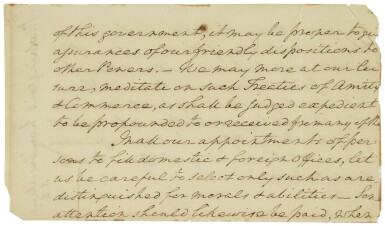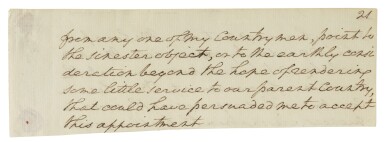WASHINGTON, George. Autograph manuscript fragment, comprising four pages from his "Compend of Husbandry," a notebook containing observations on agriculture and husbandry, no date [1790s]. 2 pages, 12mo (6 5/8 x 4 1/8 in.), evidently excised from a pocket notebook, neatly stitched with green silk thread (now cut for conservation) into a paper folder, the front labeled: "a piece of autograph writing of General Washington...1832," and containing an autograph letter of Christopher Hughes, 25 December 1832, presenting the two leaves to the Rev. Samuel Knight, "Rector of Welwyn, Herts." Modern black morocco clamshell protective case, gilt-lettered "Washington on Manure." WASHINGTON'S NOTES ON THE RELATIVE ADVANTAGES OF TILLAGE AND MANURE AT MOUNT VERNON An interesting fragment, comprising some 175 words, from a small-format notebook in which Washington commented on the works of agricultural writers and the suggestions of his planter correspondents, assessing their advice on the basis of his own experiences and experiments at Mount Vernon. Initially, when he took over the Mount Vernon plantation, Washington had sought to emulate other Virginia planters who had built considerable fortunes on the cultivation of tobacco for export to Great Britain. But, as he soon discovered, tobacco was not an ideal cash crop, nor was the clay soil of Mount Vernon very suitable for its cultivation. When a glutted market resulted in a sharp decline in the wholesale price of tobacco in the 1760s, "Washington found his dependance upon a single cash export to the mother country unacceptable on economic, and, increasingly, on political grounds" (A. and D. Fusonie, George Washington: Pioneer Farmer , p.9). From about 1764 on, Washington experimented with new cash crops, particularly grains, including wheat, corn, hops and oats, as well as hemp and flax, eventually raising over 60 different crops. As part of his long-term efforts to diversify and expand agriculture at Mount Vernon, Washington corresponded with a number of English landowners (Arthur Young in particular) and systematically studied the "new husbandry," which was being adopted in England by agricutural innovators. Washington acquired a number of books on husbandry for his library. Among the English agriculturalists whose works particularly interested the future President was Jethro Tull (1674-1741), a prosperous Oxfordshire farmer who published his experiments and theories on soil preparation in his Horse-Hoing Husbandry , first published in 1731. Washington owned a copy of the expanded third edition of 1751, which "provided descriptions of the four-coultered plow, the drill plow and a comparison of the old and new husbandry" ( Ibid , p.8). Tull strongly recommended tillage to loosen and enrich soil and denied the usefulness of cow manure, an opinion with which Washington here takes issue, based on his own experience. Washington adds Chapter and page references for the passages he refers to: "Vol.-II Chap XXX 153. lies below the upper stratum or Corn Mould is dead earth until it is turned up to the air & incorporated with manure - so that in short it is difficult to discover what sort of soil Mr. Rogers expects unless it be garden mould. Chap XXXI 154. On manuring land Mr. Tull says, that Dung is a useless article to a farm, particularly in Corn Land, recommending tillage before it, but experience proves in some degree he is wrong; for tho it is admitted that plowing will enrich or fertilize land to a great pitch, yet it is also well known that dung, compost of any sort, will cause a fermentation &c + consequently meliorate the soil and cause it to be more productive. 155. He is of Mr. Tulls', and others opinion; + therefore will not manure Corn Land; but enrich that by plowing; and lay the manure upon grass land, where reason tell us it is of use. - see these pages 155 + 156. Chap XXXII On manures in general. 157. Whatever has the most salts or nitres in it is the richest manure - and a
WASHINGTON, George. Autograph manuscript fragment, comprising four pages from his "Compend of Husbandry," a notebook containing observations on agriculture and husbandry, no date [1790s]. 2 pages, 12mo (6 5/8 x 4 1/8 in.), evidently excised from a pocket notebook, neatly stitched with green silk thread (now cut for conservation) into a paper folder, the front labeled: "a piece of autograph writing of General Washington...1832," and containing an autograph letter of Christopher Hughes, 25 December 1832, presenting the two leaves to the Rev. Samuel Knight, "Rector of Welwyn, Herts." Modern black morocco clamshell protective case, gilt-lettered "Washington on Manure." WASHINGTON'S NOTES ON THE RELATIVE ADVANTAGES OF TILLAGE AND MANURE AT MOUNT VERNON An interesting fragment, comprising some 175 words, from a small-format notebook in which Washington commented on the works of agricultural writers and the suggestions of his planter correspondents, assessing their advice on the basis of his own experiences and experiments at Mount Vernon. Initially, when he took over the Mount Vernon plantation, Washington had sought to emulate other Virginia planters who had built considerable fortunes on the cultivation of tobacco for export to Great Britain. But, as he soon discovered, tobacco was not an ideal cash crop, nor was the clay soil of Mount Vernon very suitable for its cultivation. When a glutted market resulted in a sharp decline in the wholesale price of tobacco in the 1760s, "Washington found his dependance upon a single cash export to the mother country unacceptable on economic, and, increasingly, on political grounds" (A. and D. Fusonie, George Washington: Pioneer Farmer , p.9). From about 1764 on, Washington experimented with new cash crops, particularly grains, including wheat, corn, hops and oats, as well as hemp and flax, eventually raising over 60 different crops. As part of his long-term efforts to diversify and expand agriculture at Mount Vernon, Washington corresponded with a number of English landowners (Arthur Young in particular) and systematically studied the "new husbandry," which was being adopted in England by agricutural innovators. Washington acquired a number of books on husbandry for his library. Among the English agriculturalists whose works particularly interested the future President was Jethro Tull (1674-1741), a prosperous Oxfordshire farmer who published his experiments and theories on soil preparation in his Horse-Hoing Husbandry , first published in 1731. Washington owned a copy of the expanded third edition of 1751, which "provided descriptions of the four-coultered plow, the drill plow and a comparison of the old and new husbandry" ( Ibid , p.8). Tull strongly recommended tillage to loosen and enrich soil and denied the usefulness of cow manure, an opinion with which Washington here takes issue, based on his own experience. Washington adds Chapter and page references for the passages he refers to: "Vol.-II Chap XXX 153. lies below the upper stratum or Corn Mould is dead earth until it is turned up to the air & incorporated with manure - so that in short it is difficult to discover what sort of soil Mr. Rogers expects unless it be garden mould. Chap XXXI 154. On manuring land Mr. Tull says, that Dung is a useless article to a farm, particularly in Corn Land, recommending tillage before it, but experience proves in some degree he is wrong; for tho it is admitted that plowing will enrich or fertilize land to a great pitch, yet it is also well known that dung, compost of any sort, will cause a fermentation &c + consequently meliorate the soil and cause it to be more productive. 155. He is of Mr. Tulls', and others opinion; + therefore will not manure Corn Land; but enrich that by plowing; and lay the manure upon grass land, where reason tell us it is of use. - see these pages 155 + 156. Chap XXXII On manures in general. 157. Whatever has the most salts or nitres in it is the richest manure - and a


.jpg)












Testen Sie LotSearch und seine Premium-Features 7 Tage - ohne Kosten!
Lassen Sie sich automatisch über neue Objekte in kommenden Auktionen benachrichtigen.
Suchauftrag anlegen